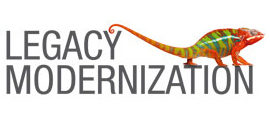Legacy modernization – What?
Legacy modernization is a constant attempt for companies to improve their services and to provide the quickest access to information. Organizations are challenged to cope with new applications and to constantly adapt their legacy software to keep up with the latest trends on the business field. The purpose is to improve customer service and compete with the same enterprises.
Basically, a legacy application is a software application that uses older programming languages. They may run on any platform, use any language and they can be in use for several years.
Legacy modernization is a software update that combines the strength of the past applications, reused up to a point, with the cutting edge technologies available today, modern software architectures.
Legacy modernization – When?
A modern company should be constantly updating to all the changes in the business field and should be able to modify the application it buys without major problems. And a responsible manager should ask for a five year prediction on the impact that business trends and technology could have.
When legacy modernization is needed, a company must evaluate its resources, meaning the applications it already has, establishing their value and their possibilities of merging with newer ones. The main issue is the balance between maintaining the old applications already paid for and investing in new up to date business opportunities. The options are quite simple, leaving things as they are without spending, or on the contrary remove them all and replace them, or, best of all, integrating new technology.
There are a few factors an enterprise must consider in order to make the right decision, such as the value provided by the existing applications, the investment made to buy them in the past on license fees, the skills of the stuff to run them today, the performance of the new software versus the old one.
Legacy Modernization – Why?
This is a strategy with a large range of reasons such as new acquisitions, the attempt to ease business processes, or mergers. A most common requirement is when two or more applications have to work together, in a process of interoperability. It is a matter of knowing how, it means extracting and interpreting current business rules in today’s complex cross organizational business environment.
There are cases when a company decides to make a radical platform migration, give up the mainframe-based applications and choose some new infrastructure. The migration process is elaborated and needs a long term strategy.
Sometimes, there are imposed legislated standards and a regulatory compliance occurs.
Reducing costs is a priority for today’s companies and sometimes modernizing the legacy systems can actually do that, since older ones are expensive to maintain, both regarding the hardware and the software. The target is to increase productivity, but at the same time to reduce maintenance costs.
Sometimes, old legacy systems are too complex, being modified several times during the business development and becoming inflexible and unwieldy or even unchangeable at all.
Nowadays, there is no way to succeed in business without software, no matter what the domain is, proper infrastructure is the key to stay on the market. And no matter in which economical branch a company is, it will always develop, so it will need more and more sophisticated applications. Business evolves, so does the software, that is why legacy modernization is needed today!
